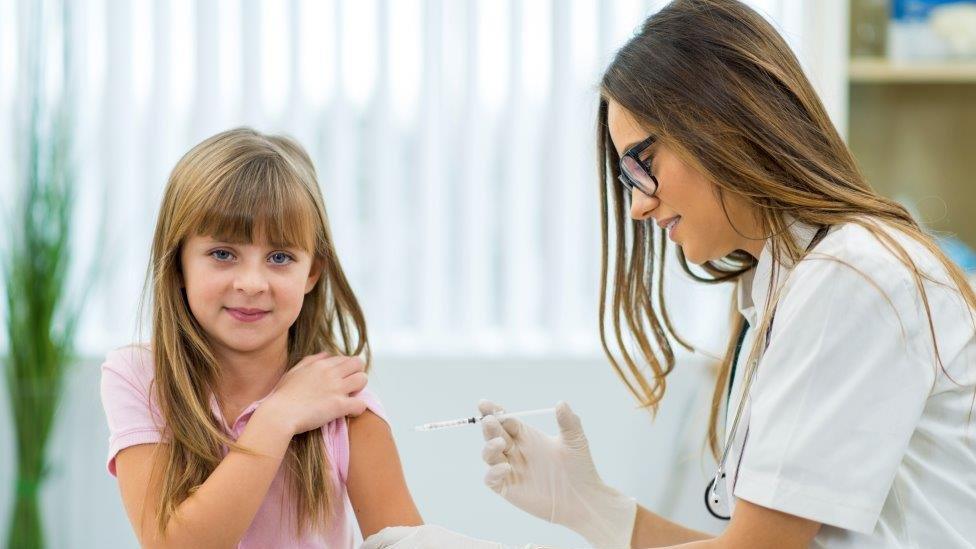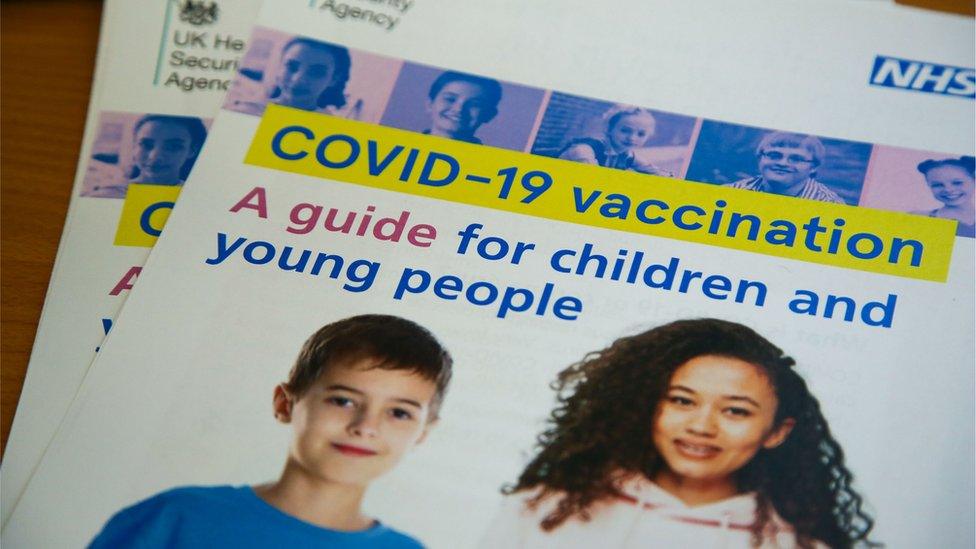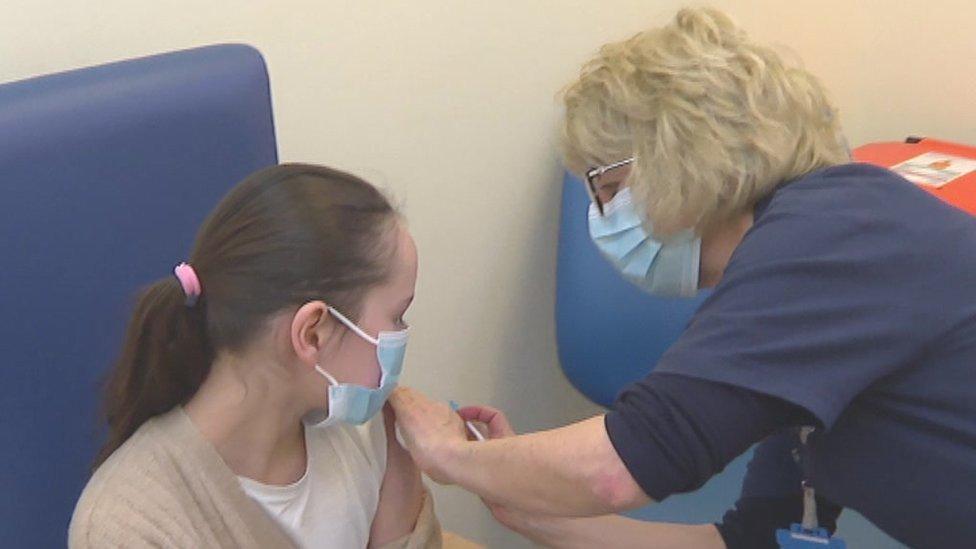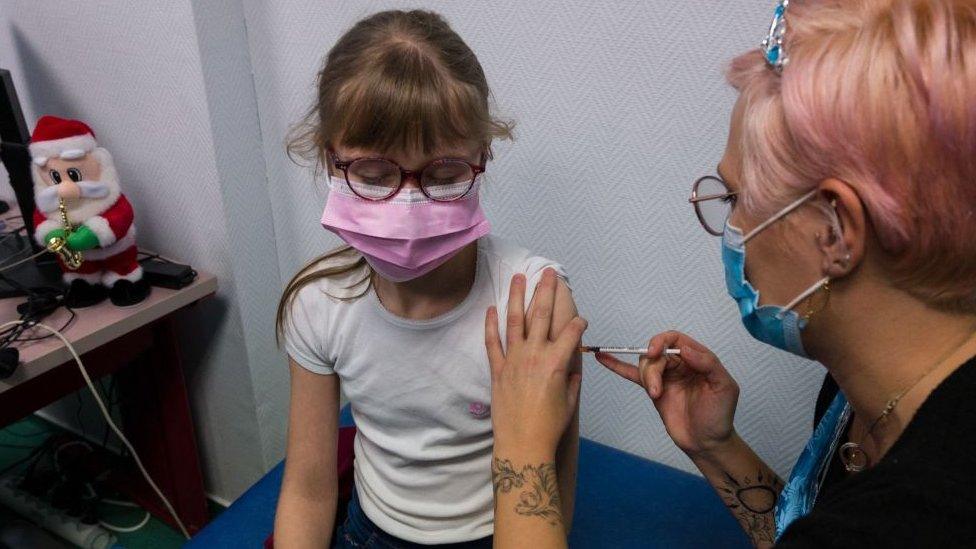Why are five to 11-year-olds getting Covid jabs?
- Published

Until now only five to 11-year-olds considered vulnerable have been eligible
Wales has become the first UK nation to say it will offer Covid vaccinations to all five to 11-year-olds.
So what does it mean for these children and their parents?
Health Minister Eluned Morgan said she followed a "yet to be published" recommendation by the UK Joint Committee on Vaccination and Immunisation.
Not all details of the programme have been announced, and there is no timetable yet.
Why is Wales offering to vaccinate five to 11-year-olds?
Eluned Morgan said in a statement, external that vaccination is the most important thing people can do to protect themselves and their children against ill health.
She said vaccines prevent up to three million deaths worldwide every year.
She urged "all families with children between the ages of five and 11, who are not in any clinical at-risk groups, to visit the Public Health Wales website, external for information about vaccination and to begin a conversation about whether they want to take up this offer".
NHS Wales began offering the vaccine to 12 to 15-year-olds last October.
This followed a recommendation by the UK's chief medical officers after they reviewed evidence on "the public health benefits", including their "mental health and long-term prospects" as well as the impact on education.
The Joint Committee for Vaccination and Immunisation (JCVI) also said the "benefits from vaccination are marginally greater than the potential known harms in this age group".
Dr Simon Williams, a senior lecturer in people and organisation at Swansea University, said Wales had joined a "growing list" of countries around the world that were offering the vaccine to the five to 11 age group.
This includes the US, Australia, New Zealand and Denmark.
A reduced dose of the Pfizer/BioNTech vaccine has been approved for use in the age group by the World Health Organization (WHO) and the EU's European Medicines Agency, he added.
Is the vaccine safe for these children?

Children are at a much lower risk from the virus than older age groups.
Healthy children are at a much lower risk from the virus than older age groups. But campaigners opposed to the vaccine have been spreading misinformation, as reported by the BBC's Reality Check.
Dr Bnar Talabani from Cardiff is part of Team Halo, external, a group of scientists and experts from around the world working to dispel myths and fake news about Covid.
She said that Covid vaccines are safe for children and can help protect them from severe illness and long Covid.
Dr Talabani said there was also strong clinical evidence that children are less likely to get side effects than adults.
"The science is actually very clear," said Dr Talabani. "We've now given over 80 million doses to children in the US in this age group. We know effects are much more rare in children than they are in adults."
Dr Williams added the jab was found to be "safe and effective" for the age group by Medicines and Healthcare products Regulatory Agency (MHRA), which assesses vaccines for their safety in the UK.
Generally, children do not get as sick from Covid, so why vaccinate them?
Dr Talabani said that while children become ill from Covid at a lower rate than adults, they can still get sick.
"The vaccines are safe and they're doing really well to protect children from nasty and severe complications like multisystem inflammatory disease, hospitalisation and death which thankfully is rare in children," Dr Talabani said.
Dr Williams said: "Ultimately the choice of whether to get the vaccine for their child will be down to the individual parent.
"Surveys have found that parents are split, with one survey finding that six-out-of-10 parents of younger children intended on getting their child vaccinated.
"The important thing is ensuring that these decisions are informed.
"Covid is much less likely to cause severe illness in children. However, it can still have unpleasant symptoms and has caused a lot of children to miss school over the past couple of months.
"Vaccines can help to reduce the risk of infection as well as help to protect against severe illness."
Does the vaccine protect children from long Covid?
Dr Talabani said the latest evidence suggested vaccinated children were less likely to get long Covid.
"The majority of children will be absolutely fine if they have Covid," she said. "But even that even those who have a mild disease, to begin with, can still go on to develop long Covid."
"We know that vaccines reduce symptoms significantly," she said. "People who've had vaccinations are much less likely to develop long Covid compared to people who were not vaccinated so the vaccines do prevent long Covid."

There are 250,000 five to 11-year-olds in Wales
She said there were 150,000 children under the age of sixteen with long Covid in the UK.
"These are kids who can't return to school on a day to day basis, who suffer from irretractable fatigue," she said. "They are struggling to do basic daily things and enjoying being kids."
"Thankfully all of these things are rare in children, but they are preventable and we know that vaccines have to prevent this."
Will the vaccine be compulsory for my child, and if not, why?
When the vaccination offer for 12 to 15-year-olds was announced, the Welsh government made clear that a parent or guardian needed to give consent for anyone aged under 16.
Consent is needed from only one person with that parental responsibility
The Welsh health minister has urged families with five to 11-year-olds to "begin a conversation about whether they want to take up this offer".
Ms Morgan encouraged them to look at the Public Health Wales website for vaccination information, external.
Dr Williams said it would "definitely not be compulsory for any children" as the issue was "controversial", "ethically problematic" and could be "counter-productive".
"Also, as we know, Covid is less severe for children and there is no argument in favour of compulsory vaccination," he added.
What if there's a dispute between child and parent over taking it?
The Welsh government has said that under-16s are "not automatically presumed to be legally competent to make decisions about their healthcare," including on the vaccine.
If there was a disagreement, Welsh government said it would "follow the law", which would include "following best practice on respecting children's rights and parental responsibility".

THE ASIAN WELSH: How immigration from the Indian subcontinent transformed Welsh health, culture and the economy
FIGHT FOR YOUR RIGHTS: X-Ray returns and they've got your back

- Published15 February 2022

- Published13 February 2022

- Published22 December 2021
